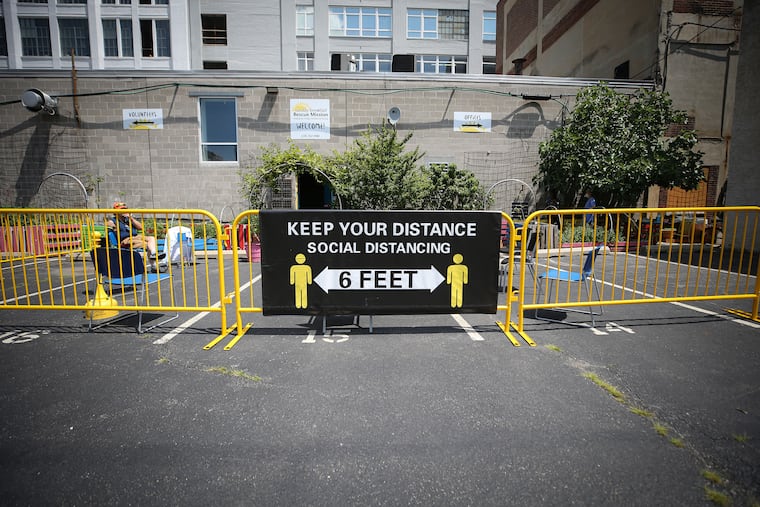Confronting the next stage of coronavirus means accepting uncertainty in science | Opinion
The coronavirus might be here to stay. Science can't give us perfect answers on what that will mean.

COVID-19 is evolving right under our very noses. It’s transforming from a pandemic disease to an endemic one — a disease that lives in the area, meaning a constant risk. Endemic diseases can be mild, like the common cold, but they can also be deadly. Malaria, yellow fever, diphtheria, smallpox, and other diseases are or have been endemic in other times and places. As COVID-19 becomes endemic, uncertainty is likely to increase, at least for a while, about the effects and severity of the disease, how exactly it spreads, and what it means to live with it on a daily basis. But as Philadelphia’s battle with tuberculosis more than a century ago shows, even without perfect information, health and other leaders can still make just decisions.
If the coronavirus becomes endemic, our fight against it becomes more complex. Who gets sick, who dies, and who survives depends on much more than infection rates. Immunity (inherited or acquired) to the disease, tolerance, adaptation, social responses, and more can transform the patterns and severity of infection. Researchers studying viruses and disease have to chase a moving target. What seems true one week seems false the next, and predictions — like of disease spread and severity — change.
Such uncertainty is a normal part of science. But the megawatt floodlights of 21st-century media covering a global emergency like the current pandemic have put every hunch, best guess, or dead end under intense scrutiny. A crisis puts a premium on certainty, while simultaneously making it hard to come by. We want definitive answers to know how to proceed, yet are dealing with an unprecedented illness, making certainty impossible.
Philadelphians have been in such a position before. On Jan. 12, 1894, the Philadelphia College of Physicians — which included some of the most skillful, knowledgeable physicians of the day — met to discuss whether to support the city Board of Health registering the names of anyone with “consumption,” an old name for what we know as pulmonary tuberculosis. A public registry would help stem the spread of the disease by making it easier to carry out contact tracing and to implement quarantines. Yet such surveillance would impose a loss of privacy, restriction of movement, and stigmatization of those on the list. How to balance public health and individual liberty?
Despite recent breakthroughs in the science of disease, the physicians found much to debate. First was whether consumption was contagious. That this remained an open question is perhaps surprising — Robert Koch’s 1882 identification of the germ and proof that it causes the disease was already legendary, the gold standard of epidemiological proof. Further, researchers had shown that consumption spread from person to person, with spitting on streets, sidewalks, and floors a major means of transmission. With all that knowledge, how could one doubt whether consumption was contagious?
Yet contagion was a flexible concept. There was rough consensus that contagion meant person–to–person transmission, but there was also ample evidence of transmission via bedclothes and household objects. Some locations were hit harder than others. Then as now, low-income, Black, and immigrant neighborhoods suffered the worst. While people of means might social distance at a rural sanatorium, the poor did not have that luxury.
» FAQ: Your coronavirus questions, answered.
One physician, therefore, suggested registering consumptive houses rather than consumptive people. Yet another responded that this would stigmatize landlords and homeowners.
What about just registering poor people or all consumptives in poor neighborhoods? One doctor argued that such a plan would inconvenience and stigmatize fewer people while still catching most cases. This idea was entertained but, fortunately, quickly shot down as unfair.
The College of Physicians ultimately voted against registration. But that was not because they had a fundamental disagreement on the particular facts of the disease. They did so after weighing uncertain medical knowledge, differing social priorities, and their own professional self-interest — not because “the science” clearly told them to. No one called tuberculosis a “hoax.”
It would be suicidal to ignore expertise.
Compare with today, when just this week, a White House adviser peddled the conspiracy theory that China “created” the coronavirus. Decisions we’ve already made, often in ignorance or outright denial of the science, are helping to make COVID-19 endemic in the U.S. Beginning in May, we saw an “epidemic” of communities, weary of cumbersome and expensive social distancing guidelines, reopening, against the advice of infectious disease experts. And as of this writing, according to the New York Times Coronavirus Tracker, 23 states, formerly trending downward, are seeing upticks in the number of cases — just as the experts predicted.
As we cope with uncertainty, and as we, too, try to balance public health and individual liberty, it is vital that we keep our wits about us. It would be suicidal to ignore expertise — and almost as deadly to demand of our experts the simple, final, absolute Truth.
Nathaniel Comfort is a professor of the history of medicine at Johns Hopkins University.